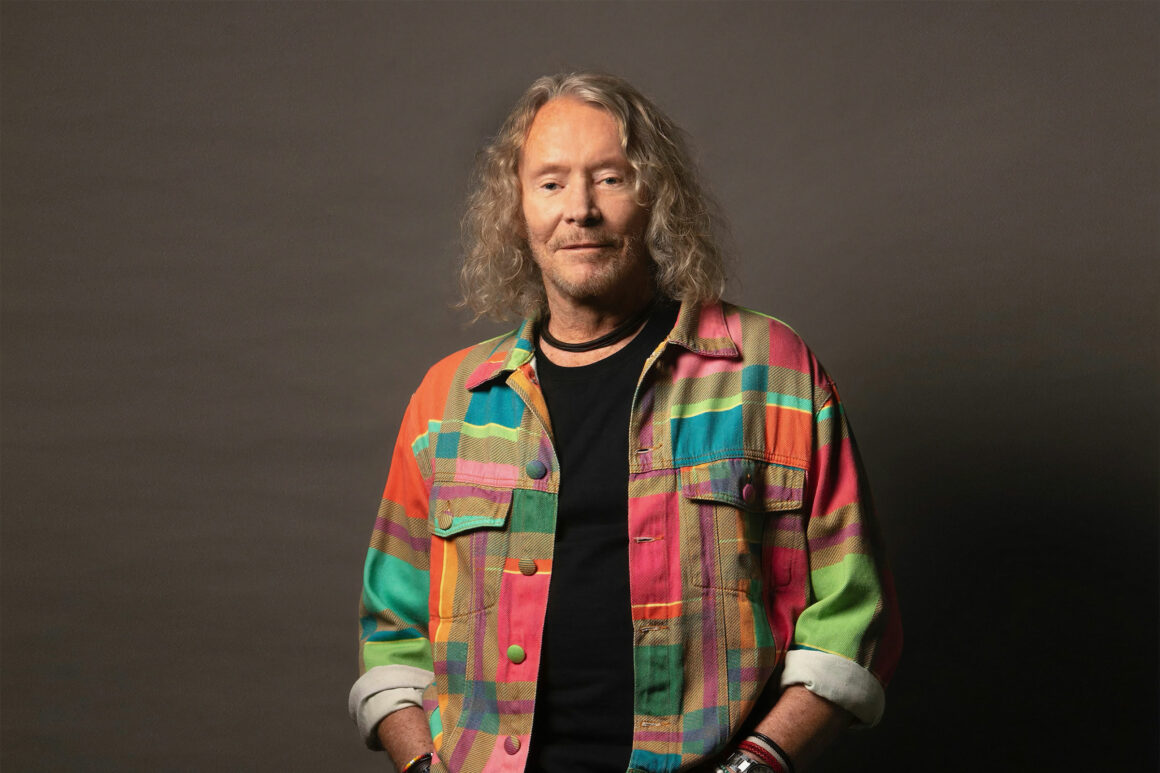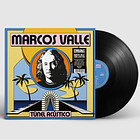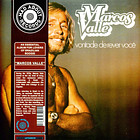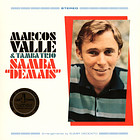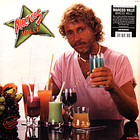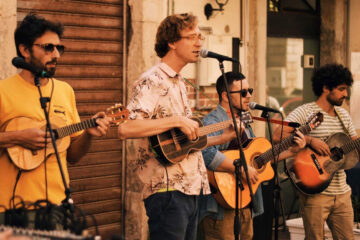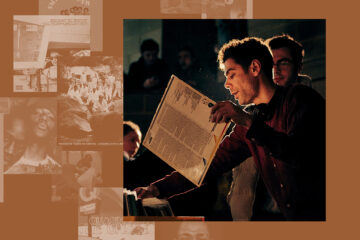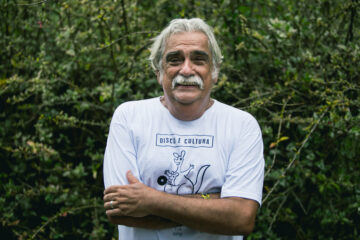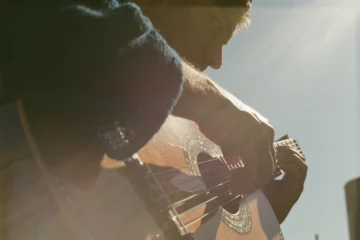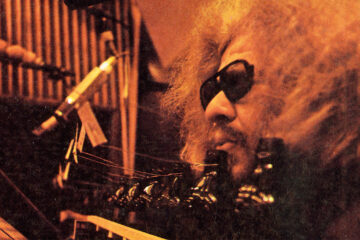Marcos Valle knows exactly why, at nearly 81, he looks like he stopped believing in impermanence half a lifetime ago. »It’s the fun, the sea and the love,« says the Brazilian bossa nova musician. »And the older I get, the more of it I have.« Valle laughs the way you laugh when you’re looking out over the Atlantic from a 4,000-square-foot penthouse like he is.
Everyone in his hometown of Rio de Janeiro knows him. Marcos Valle is a star. One who has written some of the finest humor pieces the Sugar Loaf Mountain has ever produced. One who became a fruit juice influencer before there was a word for it. And one who always found his way back to Brazil, even after fleeing to the USA.
Marcos Valle has recorded three dozen albums in more than 60 years. He is about to release the next one: “Tunel Acustico” will appear on Far Out Recordings, the label that first brought Valle to Europe and soon to the clubs in the late nineties. Since then, he has experimented with deep house, improvised with jazz musicians, and, along with bossa nova, saved love.
»After all these years, people still want to hear me,« Valle says. »And as long as they hear me, I’m fine.« With a steady stream of new tour dates around the world, that can only mean that people are listening to Marcos Valle. On stage. Or, as here, in conversation about inner dialogues and the good life.
Marcos, do you believe in God?
Marcos Valle: I do. I only learned to believe in God when I was getting older, though. But even before, I was always looking for something, I had this inner urge to find something—until I realized that music is my proof of God. I don’t need anything else. Now, I talk to God as a friend. When I go on stage, when I leave it. He is with me all the time.
What do you talk about?
Marcos Valle: God’s inside me, I don’t want to see him outside. So, it’s more of an inner dialogue, a reflection of myself.
Were you born into a religious family?
Marcos Valle: My family was catholic, but I don’t know, how much they really believed in it. I think that my father was a believer. At least, he would go to church every Sunday. Also, when I was younger, I studied in a catholic school. But I left this part of me aside for many years. It would later come up in various ways, for example: I often thought about what happens after death.

What answer did you find?
Marcos Valle: Well, let’s put it this way: Age is an advantage because you can think about your life and what lies behind you. Also, the more you experience, the more humble you get. At least, that happened to me. I don’t think that I am the best and everything revolves around me. I see that I am around life. Realizing that makes you listen. You also want to learn more.
Even with almost 81?
Marcos Valle: Even if you get older, there are so many things to learn all the time. But you need to believe in something. And age can lead to belief.
So, belief lets you keep learning?
Marcos Valle: Yes, it does. When you are successful and famous, you can become a strange person. You may forget that it’s the people who make you. If there is nobody to love your music, you are nothing. That is why I love to speak to people. After the shows, on the street. I do it happily because I know these people love my music. And I want to love them.
I suppose that you need a lot of love, then?
Marcos Valle: All the time, I can’t go out in Rio without people noticing me. But they never make me feel uncomfortable. So, when it’s possible, I like to talk to everyone because that is part of the show.
» Even when I was younger I enjoyed the night more because it was one of the few moments where I could be alone.«
Marcos Valle
You never feel it’s too much?
Marcos Valle: You have to find a balance, especially when you are over 80. Therefore, I keep myself in shape. I go to the beach because I live close to the sea. And I love water! It makes me feel good. I can walk for hours there. When I get home, I do some exercise with weights. Not heavy weights because I play the piano and do not want to get big hands. But to train some muscles. Also, I eat well and avoid meat.
Are you a vegetarian?
Marcos Valle: Well, I eat chicken and fish, so…
You eat lighter meat.
Marcos Valle: That’s it. In Brazil, you eat a lot of beans, too. They are very good for health. Combine that with a good night’s sleep and…
You go to bed quite late at night, I heard.
Marcos Valle: I go to bed at 2 o’clock, yes. The night brings me a moment of joy. There is no noise, nobody calls me. And I established a custom that helps me when I am on tour. Because on tour you never get to sleep early, and you always wake up late.
Have you always been an owl?
Marcos Valle: Marcos Valle: Yes, even when I was younger, I enjoyed the night more because it was one of the few moments where I could be alone.
You grew up on Copacabana near »Bottle Alley«. Night must have always been in motion for you.
Marcos Valle: It was a fantastic, optimistic time when I grew up. The economy was booming, we had a great president and overall, you did not need to worry about thieves or violence. Of course, there have always been social differences in Brazil. But times were more soft and relaxed. That’s why bossa nova could emerge. It was a perfect portrait of Rio.
Did you have a happy childhood?
Marcos Valle: I did. I was born into a medium-class family and I loved being in our house at Copacabana. When I opened the windows, I could always hear music. I can even remember the carnival, even though we would mostly go to the mountains during that time. My grandfather had a house in Friburgo, where we stayed. Later, I would discover the clubs, too. They would play the real music. It was not samba, though. It was the marches. This music made me so happy. Plus, my father loved popular records, for example Dorival Caymmi. Whereas my grandmother, a great pianist, introduced me to Beethoven and Bach. All these different compositions came together in my head.
Can you talk a bit more about your childhood days in Rio?
Marcos Valle: We always lived close to the beach because my father loved to swim in the sea. I remember that all kinds of people from different social backgrounds came to the beach. Nobody cared where you came from. My father always talked to everybody. That’s how I grew up. And I still feed from that when people approach me—being open to what people have to say.
»But times were softer, somehow more relaxed.That was the only reason bossa nova could come into being.«
Marcos Valle
The openness of the sea goes with the openness of your mind. Sounds good?
Marcos Valle: Yeah, this is what it’s all about. And love! I love to love. As I love nature. Not only the sea, but also the mountains and rivers and horses and crickets. Even the rain, it is so beautiful, man, I love it when it rains.
Love has always been a big thing in your music, too. How has the meaning of this word changed for you?
Marcos Valle: Well, I have been through many different political and social situations and it always changed my music. The biggest impact was when the military dictatorship started in 1964. All of a sudden, censorship would prohibit you from saying anything political. We, as artists, realized that we still had the importance of bringing information to the people. So, we changed our words and said something that the censor would not cut. That changed my music, but never my emotions.
How do you mean that?
Marcos Valle: Take my 2020 album »Cinzento«, a commentary about how bad our government was at that time and how it tainted our culture. It is the same energy that I wanted to bring to my music 60 years ago. That’s why at my shows I can play older songs—which I love—and my new ones. They are all different, but they share the same energy.
So love is, in fact, universal?
Marcos Valle: True love always is. That doesn’t mean I am blind to what happens around me. I am happy that Lula is president now. I even feel relaxed again because happiness came back. Before, we steered into a dangerous direction. I mean the extremes—whether they are right or left—who make people lose reason. So they would only follow and not think. That’s why families got torn apart, and friends started to fight. But this is not Brazil. The country was always a friendly place. It must not lack love.

I’m going to say a very cheesy thing: Enduring hate may be a lot easier when you live by the sea.
Marcos Valle: Yes, and you know why? Because people from different classes and races come together at the beach. We play ball, lie in the sun and just meet. The beach is democratic territory.
Is that why you have always returned to Rio? The beach?
Marcos Valle: Absolutely. Even when I left Brazil in 1975, I knew that I would come back. Think of me in New York. This year was a terrible time because I missed the sea so much.
That’s why you moved to Los Angeles afterwards, right?
Marcos Valle: It was better because I was closer to the sea. And Sarah Vaughan would sing my songs and Leon Ware would become my producer. And I met a lot of other artists. But even then, I was trying to make a Rio de Janeiro in Los Angeles.
Your old Petrof piano always stayed in Rio, though?
Marcos Valle: It has, and I still take care of it because this piano is part of my life. When I sit at this piano, I feel my mother with me because she bought it for me when I was a child. She really was the most important person in my life to make me follow my dream.
Related reviews
I wonder what story this piano would tell if it could speak.
Marcos Valle: It would tell so many different stories because it keeps so many different souls. People like Jobim, Herbie Hancock, Milton Nascimento and Henry Mancini played on it. Now, some keys are yellow, but I like to keep it like that. It tells the story of this piano.
I want you to ask one last thing: What do you love about yourself?
Marcos Valle: What a question!
You never thought of that?
Marcos Valle: Well, I do, but … It does not need to be something physical, right?
You can say however you feel.
Marcos Valle: Hm … I love about myself that I can be grateful. Sometimes I tell myself: Marcos, it is great that you don’t think you are a genius. You just make music because God wants you to. And so I follow God as he drives me through life. He is my medicine. And see where he took me.

